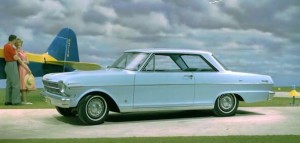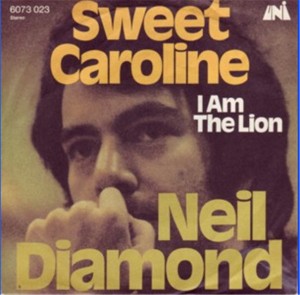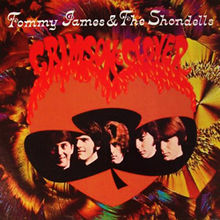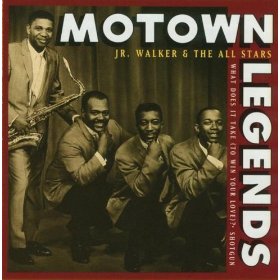Lovesick on the Shop Floor
Theme Songs Page | Previous Theme Song | Next Theme Song
Lovesick on the Shop Floor
Sweet Caroline, by Neil Diamond (1969), encountered 1969
Buy it here | See it here | Lyrics here | Sheet music here
Crystal Blue Persuasion, by Tommy James and the Shondells (1969), encountered 1969
Buy it here | See it here | Lyrics here | Sheet music here
What Does It Take (To Win Your Love For Me)?, by Johnny Bristol, Harvey Fuqua and Vernon Bullock, performed by Jr. Walker & the All Stars (1969), encountered 1969
Buy it here | See it here | Lyrics here | Sheet music here
The first car may frequently be more important in a young man’s life than the first sex. This is the obvious truth. Sometime in the first two weeks of May 1969, my dad bought me mine, a well-used blue Chevrolet Nova.[1] And it was important.
How You Could Tell
You could tell in my case just how important it was because I got into a fight with my father over that car, the very day we took delivery. One of the only two big fights I ever recall with my father, I may add. He, I, and my girlfriend had been slated to drive up together that evening to the family cottage in the Catskills, for one farewell weekend before I would take the car on to my summer back in Michigan. And, since I wasn’t really familiar from my learner’s permit experience with negotiating New York City traffic or the mountains at night, he insisted on being the one to drive the car up to the cottage. I was equally insistent that I do the driving. Voices got raised. I stormed out, till my girlfriend (who’d walked out with me) prevailed on me to call him from a phone booth. And of course he talked me back in, and I think we ended up starting for the mountains that night, just as planned, and with him at the wheel. My independence behind the wheel would just have to wait another couple of days. And it did come.
As I have indicated, my father and I almost never fought. He was the parent I always got along with. The huge blow-ups were for my mom. And this fight too should have been with my mom, as the Nova represented a victory over her protectiveness. She had been so fearful I’d kill myself behind the wheel that she had actively sabotaged my efforts to win a driver’s license even after I took driver’s ed, and made it so that I did not have a license when I went to college. As I quickly found out, it’s damned hard to obtain a license as a nonresident college student in a strange state – and you don’t even have a car to practice or take the road test in. Hence, though I cannot call to mind exactly how I finally pulled it off, I remember some of the hard times I went through to land that damn piece of plastic, including flunking the New York driver’s test at least once in Albany, courtesy of the very dad I was having the fight with, the one who had parlayed his New York City residence into a phony claim of New York citizenship for me so that I could be licensed there.
Tough to Go Home
But it wasn’t about the slightly deferred independence alone, that fight. It also happened because I was emotionally overwhelmed at that point, not only by the gift of the car, by also by the prospect of leaving my girlfriend behind, and by the thought of spending another summer in Michigan. I loved Michigan, then and always. But going back was going to be tough.
Let me count the ways. There was interrupting the studies I was starting to love with a new intensity. There was leaving the dyad my girlfriend and I had become, knowing we were free to date others, and feeling nonplussed about it. [2] And there was going back to living with my parents after the freedom of college. Worse, I knew that, apart from any difficulties inherent in simply living at home, it was likely going to be a period of great depression for my parents; my mom had lost her college teaching job, and she accurately foresaw that there would never be another job for her again that was as meaningful. She was no longer very adaptable (though she had been so once), and I was expecting her to obsess about it, which would be no fun to be around.
I was relying on the car to help with all of that, and let me count the ways on that one too.
If I couldn’t be a college student at study, maybe I could be a college student at play; maybe I could live like the Beach Boys on the album covers, make like the college kids I read about partying on spring break. Cars were good for getting to beaches and parties and places where young people congregated. If I was going on dates with unknown women, cars would be immensely helpful, especially five hundred miles away from the public transportation grid of Philly I had so come to rely on. And if I had to be with my parents, at least I could use the car to get away by going to work, because I – because the car finally necessitated that I get a job, in order to pay for insurance.
Well, that was the theory, anyway. Things worked out a little differently.
When my mom finally contemplated her defeat in the form of the blue Nova sitting in the driveway, her joy at my return took the sting out of it for her. I have a recollection of a frantic hug and her blurting out “You’re home, you’re home,” and being taken aback because I wasn’t so glad to be home, or, candidly, to see her, but having no words for what I felt, and knowing I would have had no right to say the words if I’d had them. And all she recorded in her diary was “[Jack] returns – in his car.” The dash said it all if you knew her.
Auto Worker
That was on a Wednesday. The following Monday I was at the gate of the Grove Street plant of the Ford Motor Company in Ypsilanti, the next town over from Ann Arbor.[3]  Ford’s need for assembly line workers was immediate. I took a physical in the morning, and received an offer. I went home and wrote the girlfriend.
Ford’s need for assembly line workers was immediate. I took a physical in the morning, and received an offer. I went home and wrote the girlfriend.
This is the hang-up: Ford will probably want me to work the second shift, which is 4:30 pm to 12:30 am. But it would phht! my recreational and social plans, let along virtually cut me off from my family. So for once my parents were rational and indicated that the idea didn’t send them into paroxysms of joy. Job-hunting isn’t as difficult as I feared. For one thing all the auto plants are hiring right now, because people are going off for summer vacation, and the auto makers expect the business to hold up well all summer.
It all sounds so like science fiction now, with manufacturing jobs as scarce as hen’s teeth. Yet in those times it was true.
It turned out Ford wanted me to work a shift that started at 7:00 a.m., not 4:30 p.m. as feared, so I took the job the next day.
That Friday, I wrote S., my girlfriend:
My wild summer plans have come to nought so far: my job eats up all my time. Tomorrow, for example, is a Saturday: Ford Motor Company, however, needs 165,000 shock absorbers pronto, 1/16th of which, approximately, pass through my hands. So tomorrow I work from 5:00 a.m. to 1:30 p.m. Time-and-a-half the whole time, so it comes to forty dollars for one day. Not bad for a day’s work. But it’s hard,… very hard.
I described having seen a performance of She Stoops to Conquer one evening, but feeling out-of-place amongst the cultured audience.
My hands … are getting covered with dirt that is too deep to get out with mere soap. I am beginning to feel like an hourly laborer… [Last night] I … found myself telling myself once or twice “You’re an auto worker from over at the Ypsi Ford Plant.” Not a student… An auto worker at General Parts.
And this, mind you, was after only four days on the job. I described it this way:
[It’s] so simple it took me about ten minutes to learn it: Take a washer, slap it down on the block, reach down to the conveyor belt simultaneously and pick up a shock absorber (weighs anywhere from ten to twenty-five lbs.), slap the absorber on the block, pick up mallet and pound the washer onto the shock screw, put the shock back on the belt, facing the other way, and start again. I am one of four people doing this job. I’ve got to know one of [the others] a little bit. He has been doing this same wretched job for seven years, and he still doesn’t have enough seniority to work one of the four hydraulic machines up the line. What kind of a future is that? Yet most of the thousands of automaton-men who work in the same room with me are spending their lives doing something quite similar. And most of them are quite happy to be doing it.
I topped off the letter by describing my night on the town after this day “down the works.” I went to a coffee house and saw no less a personage than the legendary Sun Ra, but I wasn’t ready for his kind of jazz, which at the time I dismissed as “pure noise.”[4] Then I went to another coffee house, where a folkie soloist was playing guitar and singing, and saw a couple of guys from my old high school trying to pick up a pair of lost-looking teeny-boppers and failing. So much for high times!
Then, during my second week, my job got harder.
Today I was elevated to operation of a steam-powered dingus known, I think, as a bushing ram. Never mind the specifics: it is hell on earth. I have to perform an incredible number of operations with sticky and uncooperative equipment at the rate of about five times a minute or more. Furthermore, if I don’t complete them, I can screw up … a quarter of the shock operations in the plant. Three times today I inadvertently shut the whole line down! And it looks as if I’m going to be doing this awful job for ten hours both tomorrow and Thursday!… You should have seen me swearing and cursing, while I was fighting that monster. Nobody seemed to do anything except criticize, except at one point at which I was getting a bit faint … and this guy I didn’t even like much came up and relieved me for a bit…. Whatever else he does, he’s my friend now. I always thought it looked pretty vulgar, all those workers chewing gum. I found out why today: your mouth gets incredibly dry.
Making the Best of Doomed
Clearly, this match of job and employee was doomed. The qualities that made for a successful auto worker had passed me by. Worse, I had yet to acquire basic skills even for holding down a job; my mom came home one day in the third week and found that I had not reported to work as scheduled, nor had I called in sick. The truth was, I was exhausted, and did not know how to deal with it.
I had gone to the shop steward and complained about the overtime, saying I had agreed to work on regular shifts, not the OT. To my outrage, I had met no sympathy. I asked my Congressman if the employer could force me to work more than 40 hours a week, and was crestfallen when I found out it could. I may have had a fair amount of book-learning by that point, but I didn’t understand the basics of assembly-line industrial relations, like the fact that allowing each worker to pick and choose hours would precipitate chaos, and the fact that almost everyone on that line welcomed the extra hours and the extra pay. If I was going to be a revolutionary, I would have to do it without followers. When I realized this, absenteeism and sullen silence had proved my only recourse, and my only response.
I have written elsewhere in this blog some disparaging things about Ford and the old Detroit auto industry; I take back nothing, but would be less than honest if I failed to add that I brought plenty of my own failings to that brief relationship – and it’s me I’m writing about here and now. If I had come to that workplace a more mature person, I still don’t know if my body or my mind would have stood up to the challenges of the job for much longer than they did,[5] but at least I would have handled myself better.
As it was, my mom and stepdad had an out to offer me, and I took it most gratefully. After years of trying to find a way to move to a better house, they finally closed the deal on a much nicer home in the Burns Park neighborhood of Ann Arbor. This move was obviously going to be a huge project, and they actually did need me to stay home and help them do it. There was no make-work about it. I guess they must have picked up the cost of the car insurance at some point.[6]
I believe I worked another three weeks, and I listened to all my parents and did give the proper notice before quitting. I was now freer, if not absolutely free, to try to have something like the kind of summer I had been hoping for.
Things Look Up A Little
Right out of the gate, I was able to host S., my girlfriend, over the July 4 weekend. I had been conjuring up images of her and feasting on the frequent letters she sent as a way of coping with the rigors of the shop floor. Longing was not as good as having, but it gave me some kind of motivation. The song that had kept going through my head while I thought of her was Neil Diamond’s Sweet Caroline, which came out toward the end of June. “Sweet Caroline” sort of scanned along with S.’s name. It kept me going. When Sweet S. actually came, it was a wonderful visit.
Then too, I was able to be of substantial help to my parents in a grown-up way. I was pretty certain (not to mention determined) that this would be my last summer at home. With a car, and, frankly, more mechanical skills than either of them possessed, I would give them something real to earn their respect and my exit visa. My memory is full of things like hauling boxes of books, digging post holes and pouring concrete for clotheslines, buying a lawnmower and cutting grass, helping assemble and stock bookshelves. My new wheels enabled me to go to the hardware store, and run out for carryout on those nights before the kitchen was assembled. Once there was a kitchen, I did some cooking. In short, I functioned as mostly an adult.
But that was it in terms of accomplishments. I wrote my freshman-year roommate that “I’ve been making shockingly bad use of my time, getting no writing done and very little reading read.” But even that admission was only in terms of my formal business of being a student. In terms of the largely inchoate, unspoken agenda I have hinted at, I truly made little progress.
Trying to Touch the Zeitgeist
The only way to describe that agenda is to remember what the world promised young people my age at that moment. There was an exciting, authentic, fulfilled way to live, so the media told us. We could hang out at the beach and party all summer long, as the Beach Boys promised. We could dress up fabulously, so we heard from Carnaby Street. We could bring peace to the world and stop the War. We could have constant sex and touch the infinite: just ask Jim Morrison. I wanted to be part of all of that.
I may have managed a little bit of the beach thing. I got away to Silver Lake with friends for an afternoon or two. I vividly remember Crystal Blue Persuasion playing on someone’s transistor radio, which to my mind is the absolutely perfect beach song. Yes, when you look at the lyrics and examine the history, you find it’s a song about God’s beneficence from a Christian viewpoint, but beaches and the relaxation one experiences there are indeed God’s gift (at least if you happen to believe in a beneficent God as I did), so there’s nothing really inconsistent there. The biblical imagery is quite dispensable. The echo-chambered guitar riff[7] and the throbbing Hammond organ are not.
I missed out on the great Ann Arbor riots, which were sort of about the War and everything else that might have been on students’ minds, and which went down less than a mile from my house. I caught a momentary sight of the turmoil down one street as I was driving home from a hard day at the factory. I did not stop either to participate or to gawk, and in fact was hardly aware of them. Worse yet, I missed out on Woodstock.
And the closest I came to the free love and infinitude part was hanging out with my friend Walter and his roommates in an apartment, watching the Moon Landing, while Walter’s randy girlfriend made jokes about transorbital insertions.[8]
Partly my being in the wrong place at the wrong time was just a quick lesson in the reality of what it’s like to experience a Zeitgeist: there may not be that much of a there there. (People I’ve talked to who were at Woodstock, for example, report feeling that they were in the wrong place to see or experience things properly.) But part of it was just my karma; I was not destined for that kind of summer cool. 1969 was as close as I would come. The adulthood I was rapidly reaching would have its own thrills. But not that kind.
Echt Southern Michigan, Ex-Southern Michigan
The song that summarizes the summer for me is What Does It Take (To Win Your Love For Me)? as performed by Jr. Walker & the All Stars, which was a great hit during that stretch. It is echt southern Michigan, gutbucket soul by a tenor saxophonist from Battle Creek playing on a Detroit label. It is infused with longing, perhaps one of the longingest songs ever recorded. It is harmonious to a fault; if you only know the song from that recording, I challenge you to hum it. You really can’t, and not just because of the baroque sax break line, but because of the two human voices you hear singing at places, in thirds, there is no lead. (When co-composer Johnny Bristol performed this in 1990 in Bristol, the harmony from an unbilled accompanist is, if anything, even tighter and more inscrutable. Do not, on any account, miss, however, Walker’s 1985 performance of the song on David Letterman, where he sings without vocal accompaniment; the melody is utterly clear there, for my money much stronger, and the playing is simply out of this world.) That song exactly chimed with my mood through much of that summer. I was lovesick, and bored, and frustrated with my family, and excited about growing up and having a car. And this is the song.
On Sunday, August 24, I got up at 5:00 a.m., got dressed, ate the breakfast my mom made, packed up the car, went with my mom to church (there turned out not to be a Mass at the anticipated hour), drove her home, and, by 6:45 a.m., motored away. Ahead lay a house where S. and I could live together, along with friends, and the college life I had been building for myself. Behind lay everything I had ever known.
When I came back next, I would be a visitor. I would never live in Michigan again.[9]
___________________________________
[1] Bought from a UN colleague of my stepmom’s, a Mr. Shezad Sadiq. It was a car that had already been around the block, so to speak; it bore a Kansas City dealer’s markings, and I don’t think people with names and accents like Mr. Sadiq’s spent much time in Kansas City in those days. General Motors had discontinued my model in 1965. Putting these clues together, I conclude I had to be at least the third owner. Source for the photo: http://wikicars.org/en/Image:1962_Chevrolet_II.jpg.
[2] Not entirely voluntary on either of our parts. I believe the girlfriend’s parents had extracted a promise from her that she would date around during the summer, and so of course it was only fair that I do so. And, to go on being fair, I think I kind of wanted it; the record is somewhat ambiguous on that score, and my memory is a little hazy as well. And rather than being evasive with each other about what we were up to as sensible kids would have done, we were fairly explicit, which was calculated to inflict jealousy and depression upon each other. Since we had already been bandying about the “m word,” I think we regarded this freedom to seek the embrace of others as sort of a test to see if we were really serious about making a lifelong commitment. But of course if you’re confiding in each other, you’re not really letting go enough to test separateness, and you’re also not engaging in the kind of confidentiality with anyone else that might give a relationship with that other person a fair shake.
[3] Source for photo: http://www.ypsilantihistoricalsociety.org/history/page999995.html.
[4] And to be honest, I still feel that way about much of Sun Ra’s music. Check out the clips Amazon sets out on this 1971 album, and see if you don’t agree.
[5] One legacy of that job is my perpetual respect for assembly line workers, especially the ones who make heavy machinery. What they do is amazing, and any white collar condescension based simply on what they do is, to be polite about it, misinformed. I continue to take a dim view of the ubiquitous foul language and some of the other things I saw; these are not all misplaced noblemen who, in Gilbert and Sullivan’s words, have gone wrong. But the work itself, and the fortitude required to make it happen, merit only admiration.
[6] At least, with my help. I have a very unhappy letter from my father, urging me to stay on the job, and lamenting what it will cost him if I don’t. Apparently I had also been ungrateful about my stepmom’s loan of the license plates. Clearly this was not my finest moment. But I know I sent some money which I earned.
[7] Sampled, to my delight, by De|Phazz in their song Sabbatical (2001).
[8] If you don’t remember the catchphrase, which you could hear on newscasts at the time, here’s a technical explanation. Of course the girlfriend had a rather different kind of insertion in mind.
[9] Well, the declaration that I never lived in Michigan again makes for a good ending, anyway. A few weeks after writing it, however, I came across clear evidence that I was back in Michigan from the beginning of July to early September of 1970, taking a History course (on the British Empire) at the University of Michigan and helping my folks in some of the ways attributed above to the summer of 1969. It certainly goes to show how unreliable memory is. I guess you could argue that if it made so small an impression, it stands as proof that I had mentally checked out at the end of the summer of 1969, and hence that there was some “poetic” accuracy to my statements that I was no longer living at home thereafter. But I’m not a poet. So all I can say is I was wrong.
Copyright (c) Jack L. B. Gohn, except for images


